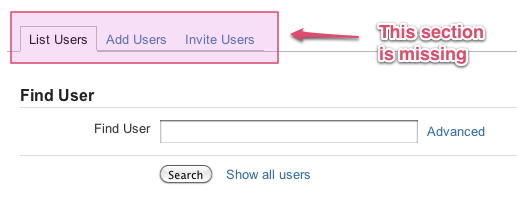Cannot Add User Because 'Add User' Link is Missing
Platform Notice: Cloud and Data Center - This article applies equally to both cloud and data center platforms.
Support for Server* products ended on February 15th 2024. If you are running a Server product, you can visit the Atlassian Server end of support announcement to review your migration options.
*Except Fisheye and Crucible
Symptoms
When an administrator goes to add a new user to Confluence via Confluence Admin > Users (or Manage Users in some versions), only the Find User option is shown. There is no visible option to add a new user to Confluence.
Causes and Resolutions
There are multiple reasons that can cause the additional user administration tabs to not appear.
Cause 1
The External user management option is selected under Confluence Admin > Security Configuration. Checking this option removes the ability to add users in Confluence as the application will fully delegate user management to an external application such as JIRA or Crowd.
Resolution 1
If you have delegated Confluence's user management to another application, you can add users in the remote application. Otherwise, disable the External user management option if you wish to add a user directly to Confluence.
More info on the 'External user management' option: Disabling the Built-In User Management
Cause 2
The Confluence Internal Directory is disabled.
Resolution 2
Log into Confluence as an administrative user from a different user directory. Go to Confluence Admin > User Directories and re-enable the Confluence Internal Directory.
If you are unable to do this within the admin UI console for some reason, you can also update this via the database:
- Shut down Confluence and create a safety backup of the database before proceeding.
Run the following query to check that the
Confluence Internal Directoryis indeed disabled (look for the "active" column, which should return "F" for "false":SELECT * FROM cwd_directory;Run the following query to set "active" to "T":
UPDATE cwd_directory SET active = 'T' WHERE directory_name = 'Confluence Internal Directory';- Re-start Confluence.
Cause 3
For reasons unknown, the Confluence Internal Directory is lacking the necessary directory operation permissions.
Resolution 3
Inject the necessary operation permissions to the directory via the database:
- Shut down Confluence and create a safety backup of the database before proceeding.
Run the following queries to check that the Confluence Internal Directory is indeed lacking permissions. A normal, working internal directory should return 12 rows returned from these two tables (
cwd_directory_operationandcwd_app_dir_operation), representing these operations: CREATE_GROUP, CREATE_ROLE, CREATE_USER, DELETE_GROUP, DELETE_ROLE, DELETE_USER, UPDATE_GROUP, UPDATE_GROUP_ATTRIBUTE, UPDATE_ROLE, UPDATE_ROLE_ATTRIBUTE, UPDATE_USER, UPDATE_USER_ATTRIBUTE. A broken one will have less than 12 or even none in both thecwd_directory_operationandcwd_app_dir_operationtables.SELECT * FROM cwd_directory_operation WHERE directory_id IN (SELECT id FROM cwd_directory WHERE directory_name = 'Confluence Internal Directory');SELECT d.id as directory_id, o.operation_type FROM CWD_APP_DIR_OPERATION O, CWD_APP_DIR_MAPPING M, CWD_DIRECTORY D WHERE O.APP_DIR_MAPPING_ID = M.ID AND M.DIRECTORY_ID = D.ID AND D.DIRECTORY_NAME = 'Confluence Internal Directory';Make a note of the
directory_idvalue from the previous queries (both should return the same directory ID). This is used in the next query.For the
cwd_directory_operationtable, modify the following query and replace the placeholder123456789value with the actualdirectory_idvalue. Please note that this was originally written for Microsoft SQL Server. If you are using a different DBMS, you may have to tweak the query accordingly:INSERT INTO `cwd_directory_operation` VALUES (123456789,'CREATE_GROUP'),(123456789,'CREATE_ROLE'),(123456789,'CREATE_USER'),(123456789,'DELETE_GROUP'),(123456789,'DELETE_ROLE'),(123456789,'DELETE_USER'),(123456789,'UPDATE_GROUP'),(123456789,'UPDATE_GROUP_ATTRIBUTE'),(123456789,'UPDATE_ROLE'),(123456789,'UPDATE_ROLE_ATTRIBUTE'),(123456789,'UPDATE_USER'),(123456789,'UPDATE_USER_ATTRIBUTE');Run this query and make note of the "Mapping ID" value. This is used in the next query.
SELECT M.ID AS "Mapping ID" FROM CWD_APP_DIR_MAPPING M, CWD_DIRECTORY D WHERE M.DIRECTORY_ID=D.ID AND D.DIRECTORY_NAME='Confluence Internal Directory';For the
cwd_app_dir_operationtable, modify the following query and replace the placeholder163842value with the actual mapping ID value.INSERT INTO `cwd_app_dir_operation` VALUES (163842, 'CREATE_GROUP'),(163842, 'CREATE_ROLE'),(163842, 'CREATE_USER'),(163842, 'DELETE_GROUP'),(163842, 'DELETE_ROLE'),(163842, 'DELETE_USER'),(163842, 'UPDATE_GROUP'),(163842, 'UPDATE_GROUP_ATTRIBUTE'),(163842, 'UPDATE_ROLE'),(163842, 'UPDATE_ROLE_ATTRIBUTE'),(163842, 'UPDATE_USER'),(163842, 'UPDATE_USER_ATTRIBUTE');- Run both the queries above.
- Restart Confluence.
